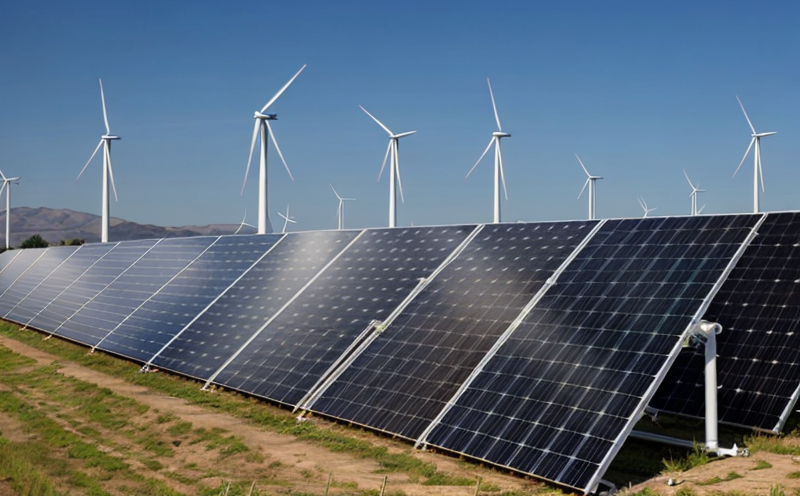IEC 62477 Safety Requirements Testing for Power Electronic Converters
The International Electrotechnical Commission (IEC) standard IEC 62477 provides a framework to ensure the safety and reliability of power electronic converters used in renewable energy systems. These devices are critical components that interface between the variable output of renewable sources such as solar panels or wind turbines and the grid, facilitating stable and efficient power delivery.
Power electronic converters are subject to rigorous testing due to their role in high-voltage environments and their potential for failure. Ensuring compliance with IEC 62477 is essential not only to meet regulatory standards but also to enhance system reliability and reduce the risk of accidents or malfunctions that could lead to property damage, injury, or environmental harm.
The testing process involves a series of detailed procedures aimed at assessing the converter's ability to withstand various stresses such as overvoltage, overcurrent, temperature extremes, and mechanical shocks. These tests are conducted on prototypes and production units to ensure consistent quality across all devices manufactured by a given company or supplier.
Key components of IEC 62477 testing include:
- Electrical Insulation Testing: Ensures that the insulation between different conductors and between conductors and earth is sufficient to prevent short circuits or ground faults.
- Overvoltage Protection: Verifies the converter's capability to handle voltage spikes without damage, which is crucial in renewable energy systems where power surges can occur frequently.
- Thermal Management: Tests how well the converter dissipates heat generated during operation. This is particularly important for systems operating under high ambient temperatures or with limited cooling.
- Mechanical Stress Testing: Evaluates the converter's resilience to mechanical shocks and vibrations, which are common in outdoor installations where converters may be subjected to environmental stresses.
The testing process is highly technical and requires specialized equipment and expertise. It involves precise calibration of test parameters and rigorous documentation of all tests conducted. The results of these tests provide critical data that can inform design improvements, enhance product reliability, and ensure compliance with international safety standards.
Compliance with IEC 62477 is not only a legal requirement but also a key factor in building trust among stakeholders, including regulators, consumers, and investors. By adhering to these stringent testing protocols, manufacturers can demonstrate their commitment to quality and safety, which is increasingly important as the global focus shifts towards renewable energy solutions.
Why It Matters
The significance of IEC 62477 compliance cannot be overstated in the context of renewable energy systems. These systems, which include solar photovoltaic (PV) arrays and wind turbines, are integral to the transition towards cleaner and more sustainable sources of electricity generation. However, the integration of such systems into existing electrical grids can introduce new challenges related to safety, reliability, and efficiency.
IEC 62477 plays a crucial role in addressing these challenges by providing comprehensive guidelines for testing power electronic converters. This standard helps ensure that these devices meet the highest levels of safety and reliability, thereby reducing the risk of accidents or malfunctions. In doing so, it contributes to the overall stability and resilience of renewable energy systems.
The importance of compliance extends beyond regulatory requirements; it also impacts the reputation and market positioning of manufacturers and suppliers. Companies that demonstrate a commitment to quality through rigorous testing are more likely to gain the trust of customers and investors, which can lead to increased market share and long-term sustainability. Moreover, adherence to international standards like IEC 62477 helps ensure interoperability across different systems and regions, facilitating broader adoption of renewable energy technologies.
In summary, compliance with IEC 62477 is essential for ensuring the safety, reliability, and efficiency of power electronic converters used in renewable energy systems. By adhering to these stringent testing protocols, manufacturers can enhance product quality, reduce risks, and build trust among stakeholders, all of which are critical factors in the successful deployment of renewable energy technologies.
Industry Applications
- Solar Photovoltaic Systems: Ensuring that inverters and other power electronic components can operate safely under varying solar conditions.
- Wind Energy Conversion Systems: Testing the robustness of converters in harsh environmental conditions typical of wind turbine installations.
- Battery Storage Systems: Evaluating the safety features that protect against overcharging and short circuits.
- Hybrid Power Systems: Assessing the compatibility and reliability of power electronic components across different energy sources.
Eurolab Advantages
Eurolab, as a leading laboratory for testing and certification in various sectors including renewable energy, offers unparalleled expertise and state-of-the-art facilities to conduct IEC 62477 compliance testing. Our team of highly qualified engineers and technicians ensures that every test is conducted with precision and accuracy, adhering strictly to international standards.
We provide a full suite of services tailored to meet the specific needs of our clients. From initial consultation on test procedures to detailed reporting and certification, Eurolab offers comprehensive support throughout the entire testing process. Our experienced team can help you navigate the complexities of IEC 62477 compliance, ensuring that your products are not only safe but also reliable and efficient.
Furthermore, Eurolab's advanced testing facilities and cutting-edge equipment allow us to simulate a wide range of real-world conditions, providing a more accurate assessment of how your power electronic converters will perform in actual use. This comprehensive approach ensures that you receive the most thorough and trustworthy results possible.
By choosing Eurolab for your IEC 62477 compliance testing needs, you can be confident that your products meet the highest standards of safety and reliability, thereby enhancing their marketability and competitiveness in a rapidly evolving renewable energy landscape.





